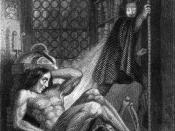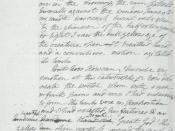The Idea of Discovery in Mary Shelley's Frankenstein
In Mary Shelley's Frankenstein, the idea of discovery is a central theme: original
discovery is wonderful and naive, yet ends in desolation and corruption. The ambitions of
both Frankenstein and Walton (to investigate new lands and cast scientific enlightenment
on the unknown) are formed with the best of intentions, however a grave disregard for the
sacredness of natural boundaries is trespassed. Throughout Shelly's novel the idea of
discovery remains idealized, unfortunately human imperfection completely corrupts all
pursuit of that once so cleat ideal. The corruption of discovery can be seen through the
corruption that is natural in every human life, every child begins as a pure and perfect
creature, but in time hardens into a narcissistic, covetous, overly striving adult. Only by
the end of the novel does Walton understand that he must discard his own desire (the
mapping of previously uncharted land), out of concern for the life of his crew.
The idea of discovery occurs quite early in the novel. In his first letter to his sister,
Walton compares his feelings on the expedition to a child's joy (12). Walton fondly
remembers his uncle's great library of discovery literature (tales of men at sea and
adventurers), all of which he poured over as a child. He writes of his displeasure when
recounting his father on his deathbed, forbidding him to "embark in a seafaring life" (13).
Walton later informs Frankenstein that his crew is on a "voyage of discovery." It should
come of no surprise that only at the mention of this word, Frankenstein agrees to board
the ship (23.) Once on board, Frankenstein recounts his history. Frankenstein, too, was
possessed by a youthful fixation: the desire to acquire scientific knowledge, and to create
an indestructible man (41.)...


